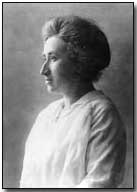Who's Who - Rosa Luxemburg
 German revolutionary leader,
journalist, and socialist theorist.
German revolutionary leader,
journalist, and socialist theorist.
Rosa Luxemburg (1871-1919) saw herself as a citizen of the proletariat.
She lived the international life of a Socialist 'pilgrim', believing that only socialism could bring true freedom and social justice.
Luxemburg was an advocate of mass action, spontaneity, and workers democracy but her criticism of the revisionist position of Edward Bernstein is considered her most important legacy to European political thought:
"Bourgeois class domination is undoubtedly an historical necessity, but, so too, the rising of the working class against it. Capital is an historical necessity, but, so too, its grave digger, the socialist proletariat."
(from 'The Junius Pamphlet', 1916)
Rosa Luxemburg was born in Zamosc, in Russian Poland, into a Jewish middle-class family. At the age of five she became seriously ill. After recovering she walked with a limp and later sciatic pain caused her much trouble.
She was educated at the Warsaw Gimnazium and from the age of 16 participated in revolutionary activities. Her favourite writer during these years was the Polish poet Adam Mickiewicz, whose patriotism and life in political exile influenced her deeply.
In 1889 she moved to Switzerland to continued her studies. In part she was forced to flee from Poland on account of her political activities. Luxemburg entered the University of Zurich, where she studied natural sciences and political economy.
She began her career as a journalist and became one of the leaders of the Social Democratic Party of the Kingdom of Poland and Lithuania. In 1898 Luxemburg completed her doctorate; her dissertation was entitled 'The Industrial Development of Poland'.
1899 sae the appearance of Luxemburg's 'Reform or Revolution', her defence of Marxism. It opposed Edward Bernstein's reformist position and criticized Bernstein's revisionist theories in his 'Evolutionary Socialism' (1898).
A German citizen by marriage Luxemburg became in 1898 a left wing leader of the German Social Democratic Party (SDP) and participated in the Second International and during the 1905 revolution in Russian Poland.
The following year, 1906, she was arrested in Warsaw but ultimately finally on health grounds. She returned to Germany where she taught at the SDP school in Berlin until 1914, developing ideas about general strike as a political weapon.
1912 brought the publication of her major theoretical work, 'The Accumulation of Capital', in which she attempted to prove that capitalism was doomed and would inevitably collapse on economic grounds.
Following differences with moderate German socialists Luxemburg founded, with Karl Liebknecht, the radical Spartacus League in 1916. Two years later the organization became the German Communist Party.
Luxemburg spent much of World War I in prison, meanwhile writing her 'Spartakusbriefe' and 'Die Russisce Revolution', where she welcomed the October Revolution as a precursor of world revolution. In the wake of the Spartacist uprising in Berlin against the government, in which she proved a reluctant participant, Luxemburg and Liebknecht were arrested in 1919.
While being transported to prison she and Liebknecht were murdered on the night of 15/16 on January 1919 by German Freikorps soldiers. Luxemburg's body was thrown into the Landwehr canal and found several months later in May. She was buried on June 13 in Friedrichsfeld cemetery where Liebknecht and other revolutionaries were similalrly buried.
Luxemburg's lover Leo Jogiches was also murdered in 1919. Just before his death he had decided with Clara Zetkin and Mathild Jacob to publish Luxemburg's collected works. The project proceeded slowly on account of objections lodged by Lenin to Luxemburg's work. Lenin argued that Luxemburg had underestimated nationalist ideology, underrated the role of the Communist party, and overly emphasised the power of mass action.
Luxemburg in turn was critical about Lenin's acceptance of the idea of national self-determination. Luxemburg's collected works were eventually published in East Germany between 1970-75.
"The list of people with whom Simone Weil was politically associated reads like an almanac of the French Left. Thévenon, Guérin, Battaille, Serret. Simone saw in Rosa Luxemburg (d. 1919) a kindred soul. 'Her life, her work, her letters affirm life and not death,' wrote Simone. 'Rosa aspired to action, not to sacrifice. In this sense, there is nothing Christian in her temperament.'"
(from 'The Left Hand of God' by Adolf Holl, 1997).
Thorough re-evaluation of Luxemburg's work began in her German homeland in the 1970s. Her theories were increasingly considered an alternative to Communism or Social Democracy. When Marxist study began to lose its allure in the 1980s, Luxemburg arose still further interest among feminist theorists.
Luxemburg herself did not involve herself with the women's rights movement: female liberation was for her part and parcel of the liberation from the oppression of capitalism.
Article contributed by Petri Liukkonen, website Author's Calendar.
The Austro-Hungarian declaration of war was the first ever delivered by telegram.
- Did you know?
